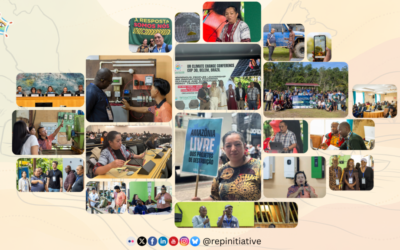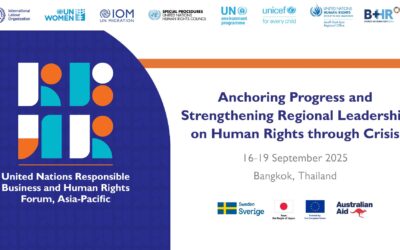Coal mining is destroying the forests of Siberia. Contamination of the taiga and rivers is harming the Shor people, who live from hunting, gathering and fishing. Anyone who stands up to the government and companies in defense of the right to nature suffers threats and harassment.
Kemerovo Oblast or Kuzbass is a region in southwestern Siberia where coal mining forms the most important sector of the economy. There are 160 active mines and pits and another 106 under construction in Kuzbass. A total of 248.7 million tons of coal were mined here in 2019. The region accounts for almost 60% of mining in Russia and 75% of its coal exports.

Over the past 15 years, the number of open-pit coal mines has increased several times over. This kind of mining is more profitable for subsoil users. However, it has turned the region’s beautiful environment into a pockmarked moonscape; the taiga (forest) has been decimated, the rivers have been flooded with coal slurry, poisonous heaps of waste rise over the land, and the air is polluted. The Shors and Teleuts, Indigenous Peoples that have lived in this region for centuries, are trying to survive amidst this apocalypse. Today, their major problem is barbaric coal mining but gold mining in taiga rivers is also poisoning the last remaining corners of the forest where Indigenous Peoples can still hunt and fish.
According to the most recent census, there are just over 12,000 Shors and approximately 2,500 Teleuts remaining. They mostly live in rural areas, where they hold on to their language, culture, sacred sites, traditional worldview (ancestor worship; religious practices related to harvesting; and other beliefs), and their traditional activities (hunting, fishing, gathering, beekeeping, gardening, and, until the 19th century, iron-smelting), which are still their main sources of income and food. The village is a place of strength for Indigenous Peoples: even those who have migrated to cities or outside the region maintain their connection to their native villages.
However, coal mining is systematically destroying Shor villages and one of the best-known cases is that of Kazas.
Kazas village
Kazas lays within Myski municipal district and is on the list of territories of traditional residence and territories of traditional activities of small-numbered Indigenous Peoples of the Russian Federation, the government’s legal designation of areas traditionally inhabited by Russia’s Indigenous Peoples. In 2012, part of the new Beregovoy coal mine owned by the Yuzhnaya company was built on this village’s land.
A condition of the license issued by the Federal Agency for Subsoil Use for the development of the Beregovoy mine was that the residents of 28 houses in Kazas village had to be relocated. Without consulting or notifying the village residents, Myski’s mayor signed a relocation agreement with Yuzhnaya, who started to push residents to sell their homes and land, offering a price 10 times below their actual market value. Those refusing to abandon their ancestral lands were threatened with having their homes burned or razed with bulldozers.
“People were forced to sell their land. The company created a difficult environment. They set up a checkpoint at the entrance to the village and we had to pass through it to reach our houses. It was hard to exist like this. Naturally, in these conditions, many residents just sold their homes.” (Vladislav Tannagashev, Shor.)
These threats became more than just words. Between November 2013 and March 2014, the homes of people who refused to sell were burned down by unidentified people. Criminal cases were opened but the guilty parties were never found, even though the only way to enter the territory was through a guarded checkpoint equipped with video cameras.
“The first snow had just fallen, and there were tracks showing that people climbed over the fence. They climbed over, set some flammable materials on fire, and threw them. A fire broke out. The arsonists’ cars passed through the village checkpoint. The checkpoint has lots of cameras, and there’s one camera pointing directly at the village right before you enter it. Yet not one camera caught the license plate, and the guards didn’t write it down.” (Nikolai Kastarakov, resident of Kazas.)
“We never had any incidents of arson like this; we never even had a house burn down through our own fault. This all started after Yuzhnaya arrived.” (Vladimir Tokmagashev, resident of Kazas.)
In its official responses to letters from Kazas residents, the region’s Public Prosecutor’s Office stated that the public discussions of the relocation agreements with the coal company had breached the rules and that the decision to relocate the village had not been adopted in the manner established by law. That did not prevent Yuzhnaya from continuing to mine coal under a license obtained without fulfilling its relocation obligations.
Members of the Myski municipal council discussed the idea of relocating Kazas village to a new place but the proposed plot – a swampy wetland area – was not suitable for habitation. The situation in Kazas was the subject of a number of human rights reports to various UN human rights mechanisms and the UN Committee on the Elimination of All Forms of Racial Discrimination recommended that the rights of Kazas residents be restored. However, the problem has yet to be resolved. The relocation programme has not yet been adopted and the Russian government has not compensated the Shor people for the loss of their land and homes, not even in the form of land grants. In early 2020, local authorities and Yuzhnaya representatives met with Kazas residents following another round of recommendations from the UN Committee on the Elimination of All Forms of Racial Discrimination but no agreement was reached.
Yana and her fight for the land of the ancestors
One of the fiercest defenders of Kuzbass’ natural environment – and one who has paid a high price for it – is Yana Tannagasheva, a Shor woman whose ancestors lived in Kazas village. Yana, a Russian language teacher at a public school in a town not far from Kazas, first became an activist in response to the expansion of coal mining onto the ancestral lands of her community.
Although Yana was born in a nearby city, she and her family have always maintained the link with the village of their ancestors. When she was a child, every summer she and her family would spend a few weeks in the village helping her grandfather during the hay harvesting season. Back then, the mines were still 10-15 kilometres from the village. As the open-pit mines reached closer to the village, dust and soot from the mines started to pollute the villagers’ fields, gardens and nearby river. The villagers could hear the constant explosions from the mines.
As Yuzhnaya sought to expand its operations onto Kazas village lands, many villagers accepted the meagre compensation offered by the company and left. In six months between 2013 and 2013, six houses whose owners refused to give up their lands were burned down, including Yana’s ancestral home. The nearby holy mountain of Karagai-Lyash, a dwelling place of powerful spirits, was partially destroyed by the miners. Eventually the whole village was erased from the map, and only the cemetery still remains.
In the beginning, Yana combined her activism with her work at school. She helped her husband, Vladislav, who was leading the Renaissance of Kazas and Shor Peoples Organization, editing communication materials and statements by activists. When her employer, the local Department of Education, learned about her activism, Yana was forced to resign from her position as a teacher. Ironically, this happened just months after she was nominated Teacher of Kemerovo Oblast (region) in recognition of her outstanding achievements as a teacher. Some of her friends and acquaintances asked her: “Why do you do this? What’s in it for you?” But, for Yana, it was clear that if the Shor culture and peoples were to survive, their right to a clean and healthy natural environment had to be defended.
As Yana and her husband continued their activism, as they continued to publicize the tragedy of Kazas village, they started to receive threats from the law enforcement agencies, including Russia’s mighty secret police, the FSB, and representatives of mining corporations. They were questioned, handed warnings and received verbal threats. Some of their relatives were even used to communicate those threats – on a number of occasions Yana would receive hints along the lines of: “Don’t you worry that something might happen to your children?” Or that something might happen to her husband, and she would be left a widow.
In 2016, Yana spoke before the Committee on the Elimination of Racial Discrimination in Geneva where she not only informed the Committee of the ongoing ethnocide of the Shor culture but also accused the Russian authorities of deliberately providing false information to the Committee. Following her intervention at the UN, Yana and her husband were portrayed by the local media and in comments by authorities as anti-Russian agents whose activism was being funded by Western interests and they were subjected to even greater pressure. From then on, the authorities started to follow them – there would often be a car parked outside the apartment block where Yana lived with her family and these cars would often follow Yana and her husband on their daily business. In 2017, the family survived a car accident. Although the family cannot prove that the accident was deliberate, let alone who was responsible, there were many indications that it could be related to their activism.
Exile for Yana and her family
Since Yana did not stop her activism, the authorities and Yuzhnaya decided that legal, administrative and media harassment were insufficient and started to target Yana’s children with their pressure and threats. One day, her son told her that an unknown man had followed him to the music school he was attending. Yana and her husband began escorting their children back and forth to school, often followed by unknown people. In some cases, she managed to record her trails on her camera.
Eventually, the pressure became too much to bear. While Yana and her husband Vladislav were prepared to take certain risk themselves, they were not ready to risk the health and lives of their children. In 2018, taking advantage of a situation when the security and law enforcement agencies’ attention was directed on a protest in the region’s capital, the Tannagashevs travelled to Moscow and, from there, to Sweden where they applied for political asylum. Two-and-a-half years later, in 2020, they received it.
Today, Yana and Vladislav live in the north of Sweden, where the climate and landscape remind them of their native southern Siberia. Yana, Vladislav and their children are now members of Naturskyddsföreningen (the Swedish Society for Nature Conservation). They are continuing their activism in support of Indigenous rights and climate activism and are telling the world about the environmental disaster unfolding in Kuzbass and how this affects the Shor people of the region. Even in Sweden, however, they continue to receive threats from Russia.
Yana has written poems about the tragedy of her people:
Swallowing coal dust,
The sorrowful Shor man will say:
“My taiga, my river, my mountain,
You have turned into soot.
I did not protect you for my grandchildren,
Who were planning tomorrow
To walk along the path of cedars,
To gather wild garlic for breakfast,
To catch roach fish in a cage trap,
To take a rifle for hunting,
And my grandad’s old rucksack,
That he kept all these years.”
The fight for Kuzbass environment continues
Meanwhile, the peoples of Kuzbass continue to protest. On 13 June 2020, residents of Cheremza village staged a protest against the activities of the Kuznetsky Yuzhny mine, which had decided to build a coal loading station near their homes without having obtained the proper consent. The protest went on for months and, besides local residents, attracted activists from other parts of the region and even other regions of Russia. Over the course of two-and-a-half months, the Kuznetsky Yuzhny mine’s management was unable to convince the protestors that the project did not pose a danger to their health or the environment. Numerous attempts to start construction work ended in skirmishes between the protestors and coal company representatives. As a result, the coal company suspended construction and removed the construction equipment. On 21 August, it was reported that the construction permit had been rescinded.
However, neither the authorities nor the coal companies forgave the protestors their victory. Just as in the case of Yana, activists started to receive threats, and many were subjected to judicial harassment, arrests and smear campaigns. And the authorities did not forgo their detestable practice of applying pressure through children, just as they did in Yana’s case. Officers from the Novokuznetsky Precinct tried to forcibly remove the children of at least two female protestors on the pretext that by participating in the protests the parents had violated COVID19-related rules. Fortunately, in this case, the parents managed to retain custody of their children but the fight for Indigenous Peoples’ rights and for the right to a clean environment continues and it is clear that the authorities and extractive industries involved are ready to use whatever means it takes to progress their agenda.
The Shor writer Lyubov Chulzhanova said that “The barbaric treatment of nature and indigenous peoples is leading the world to self-destruction. But the greed of the coal fat cats has blinded them to reason, so they continue to destroy nature and dig a grave for everything living on the Earth. We cannot achieve material well-being and sustainable development by desecrating the foundations of life – clean air, clean water, clean land – or by wiping out plants, animals, and people. We must observe not just human rights and Indigenous rights, but the right of everything living on Earth to life. Otherwise, humankind will perish”.
ADC Memorial is a Brussels-based human rights organization.
Source: IWGIA




0 Comments